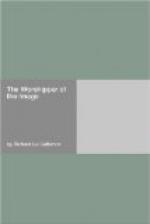“Best of them I love two: one a laughing giant who loved me three hundred years ago, and the other a little London boy with large eyes of velvet, who mid all the gloom of your great city saw and loved my face, as none had seen and loved it since she of Mitylene. I found the giant sitting by a country stream, holding a daffodil in his mighty hands and whistling to the birds. He took and wore me like a flower. I was to him as a nightingale that sang from his sleeve, for he loved so much besides. Yet me he loved best, as those who can read his secret poems understand. But my little London boy loved me only. For him the world held nothing but my face, and it was of his great love for me that he died.”
“But these were all poets,” said Antony.
“Yes, poets are the greatest of all lovers. Though all who since the world began have been the makers of beautiful things have loved me, I love my poets best. Sweeter than marble or many colours to my eyes is the sound of a poet singing in my ears—”
“For whom, Silencieux, did you step down into the sad waters of the Seine?”
“It was a young poet of Paris, beloved of many women, a drunkard of strange dreams. He too died because he loved me, and when he died there was none left whose voice seemed sweet after his. So I died with him. I died with him,” she repeated, “to come to life again with you. Many lips have been pressed to mine, Antony, since the cold sleep of the Seine fell over me, but none were warm and wild like yours. I loved my sleep while the others kissed me, but with the touch of your lips the dreams of life began to stir within me again. O Antony, be great enough, be all mine, that we may fulfil our dream; and perhaps, Antony, I will die with you—and leave the world in darkness for your sake, another hundred years.”
Exalted above the earth with the joy of Silencieux’s words, Antony pressed his lips to hers in an ecstasy, and vowed his life and all within it inviolably to her.
CHAPTER VIII
A STRANGE KISS FOR SILENCIEUX
One hot August afternoon Antony took Silencieux with him to a bramble-covered corner of the dark moor which bounded his little wood. A ruined bank soaked with sunshine, a haunt of lizards, a catacomb of little lives that creep and run and whisper, made their seat.
Silencieux’s face, out there under the open sky and in the full blaze of the sun, at once lost and gained in reality; gained by force of a contrast which accentuated while it limited her, lost by opposition to the great faces of earth and sky. Her life, so concentrated, so self-absorbed, seemed more of an essence, potently distilled, compared with this abounding ichor of existence, that audibly sang in brimming circulation through the veins of this carelessly immortal earth.
For some moments of self-conscious thought she shrank into a symbol,—a symbol of but one of the elements of the mighty world. Yet to this element did not all the others, more brutal in force, more extended in space, conspire?




